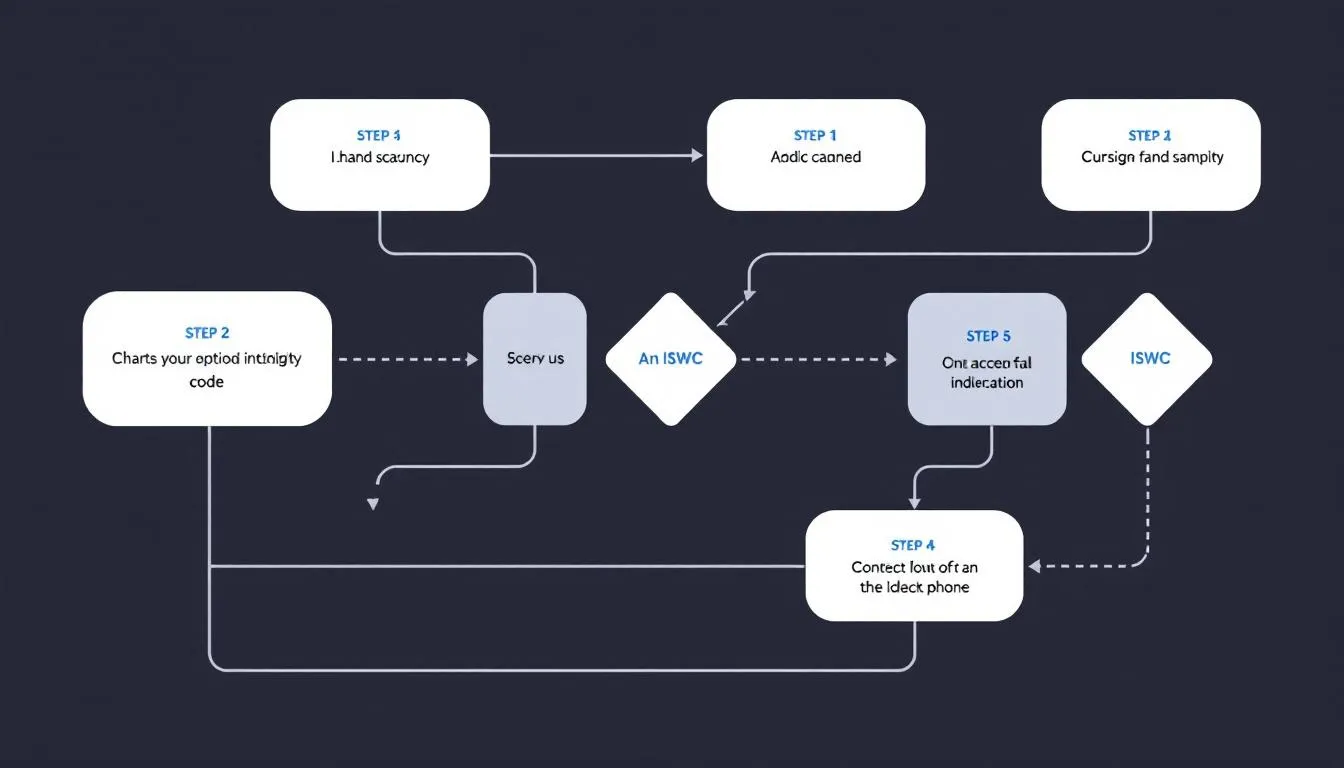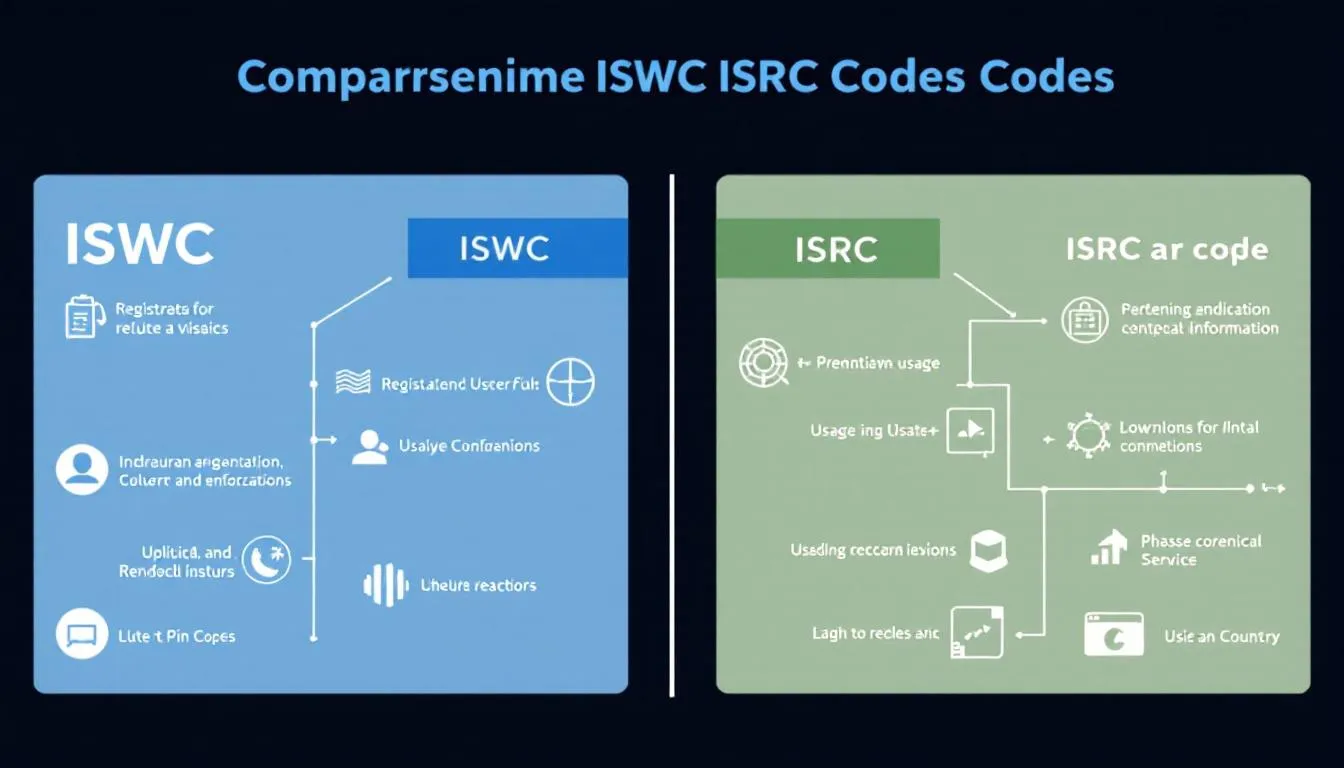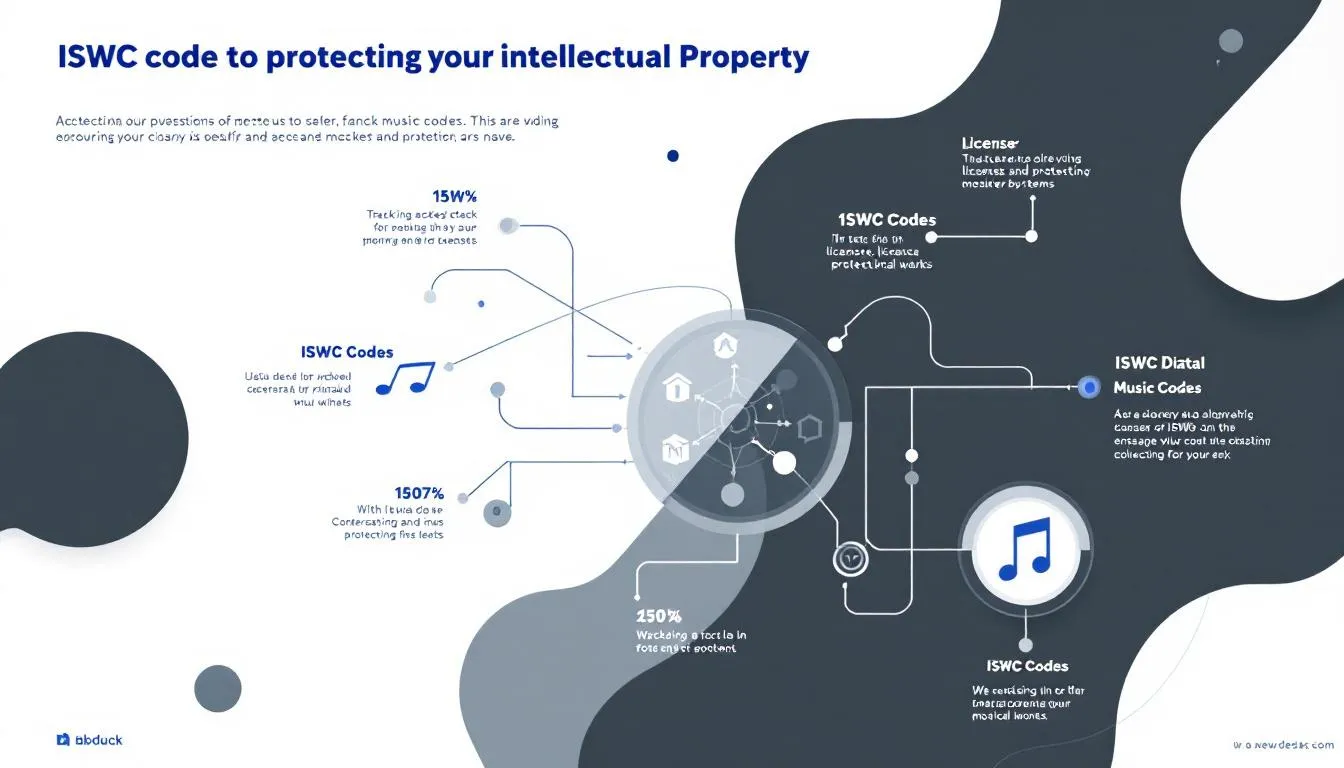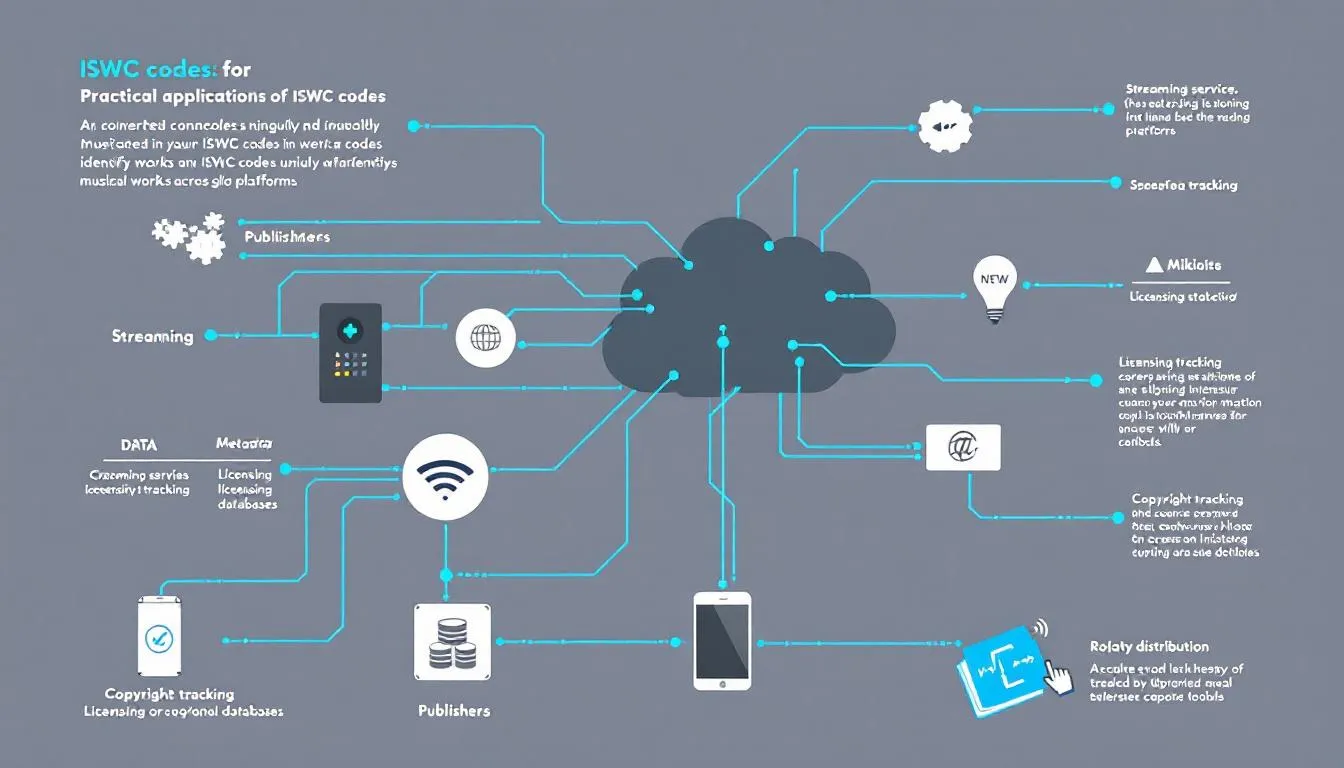An ISWC, or International Standard Musical Work Code, uniquely identifies musical compositions. Many songwriters and publishers may have already heard of ISWC and related codes, as these terms are commonly discussed in the music industry. It’s key for tracking royalties and ensuring songwriters and publishers get credited. This guide covers what an ISWC is, its significance, and how you can obtain one.This guide covers what an ISWC is, its significance, and how you can obtain one. For further insights on music metadata and its impact on royalty tracking, you can visit our detailed article on Music Metadata: ISRC, ISWC, UPC, DDEX. Additionally, if you’re interested in understanding how AI tools are shaping the future of music production and rights management, check out our guide on How AI and Royalty-Free Instrumentals Are Shaping Rap’s Future. For practical tips on promoting your music and building your career, see our comprehensive Ultimate Music Career Guide.
Key Takeaways
- ISWC codes are crucial for the identification and tracking of musical works, enabling accurate royalty management and ensuring rightful compensation for creators.
- ISWC codes are assigned by authorized Registration Agencies and are essential for protecting intellectual property and recognizing musical compositions globally.
- The integration of ISWC and ISRC codes is vital for effective music rights management, facilitating streamlined royalty distribution and accurate tracking across various platforms.
Understanding ISWC Codes

In the vast and intricate ecosystem of the music industry, ISWC codes stand as vital pillars. These unique identifiers serve as an internationally recognized reference number for identifying musical works, ensuring that every song, from a chart-topping hit to an obscure indie track, is tracked accurately across various platforms and territories. The importance of ISWC codes cannot be overstated—they are crucial for recognizing musical works globally, allowing all stakeholders to manage and track rights seamlessly.
ISWC codes go beyond identification; they are crucial for:
- Accurate royalty tracking and management.
- Guaranteeing songwriters and publishers get the recognition and compensation they deserve by uniquely identifying each musical work.
ISWC codes help address different aspects of a musical work, such as the written composition and its associated metadata.
- Aiding in maintaining an organized and efficient catalog of musical works through automatic assignment during the registration process.
Definition of ISWC
An ISWC, which stands for International Standard Musical Work Code, serves as a unique identifier. It is permanently assigned to musical works. This identifier is globally recognized and is assigned by collection societies. The ISWC number begins with a ‘T’ followed by nine digits and a check digit, making it a precise tool for identifying compositions. For example, an ISWC code might look like T-123.456.789-0. The ISWC is an 11-character code beginning with “T,” followed by nine digits and a check digit.
The ISWC code tracks crucial details about a musical work, including the song title, songwriter contributions, and publisher information. This comprehensive tracking capability makes ISWCs important for managing royalties and ensuring that the creators are rightfully compensated for their work.
Purpose of ISWC
The primary purpose of ISWC codes is to serve as a unique identifier for musical works, facilitating their recognition and management across various platforms. Whether the music is performed live, streamed online, or broadcasted, the ISWC attached to the work ensures that it is recognized and tracked accurately. This standardization is essential in the digital age, where music is consumed across a multitude of platforms.
Moreover, with an ISWC number, the data associated with musical works can be effectively managed, leading to accurate tracking of royalties and usage. This ensures that songwriters and publishers can monitor their works and receive appropriate compensation no matter where or how their music is used.
Origin of ISWC
The ISWC system was developed by the International Confederation of Societies of Authors and Composers (CISAC) to standardize the identification of musical works globally. Before an ISWC code can be assigned to a musical work, it must be registered with a performing rights organization (PRO). Songwriters and publishers often need to join a PRO to register their works and obtain an ISWC code. This ensures that all necessary information is captured and verified before the code is issued. The first ISWC was assigned in 1995 to the song ‘Dancing Queen’ by ABBA, marking the start of a standardized system for musical works.
The assignment of ISWC codes is carried out exclusively by authorized local or regional Registration Agencies, ensuring that the administration and tracking of musical works are handled with responsibility. For example, PRS for Music is the designated agency for ISWC assignment in the UK. This structured approach helps in maintaining an accurate and reliable registry of musical works, facilitating better management and royalty tracking. ISWCs are assigned by the International Confederation of Societies of Authors and Composers (CISAC) after works are registered with performing rights organizations.
Acquiring an ISWC Code

For songwriters and publishers, acquiring an ISWC code is a crucial step in protecting and monetizing their musical works. This unique identifier helps in tracking and managing royalties, ensuring that creators receive due compensation for their compositions.
Musical works must be registered with authorized agencies, such as Performing Rights Organizations (PROs), to obtain an ISWC code. The process involves completing a registering form that details the composition and submitting it to the relevant agency. This ensures that all necessary information is captured accurately, enabling the proper assignment of the ISWC number.
Who Assigns ISWC Codes?
ISWC codes are assigned by authorized Registration Agencies, which are responsible for processing applications and managing the ISWC registry. Organizations such as PRS for Music and ASCAP play a significant role in assigning ISWC codes to musical compositions, ensuring proper administration and tracking.
Once an ISWC code is assigned to a musical work, it remains permanent regardless of different versions or arrangements of the composition. This consistency is vital for accurately tracking and managing musical works across various platforms and territories.
Process of Obtaining an ISWC
Publishers need access granted by their affiliated Society to utilize the ISWC Allocation Service and acquire an ISWC code. This process involves:
- Filling out a registration form that details the composition
- Submitting the published request form to the relevant agency
- Ensuring all necessary information is accurately captured
The ISWC code is then assigned, providing a unique identifier that helps in managing and tracking the musical work. This process is essential for ensuring that songwriters and publishers can monitor their compositions and receive appropriate royalties.
Importance of Accurate Metadata
Accurate metadata is crucial during the ISWC registration process to ensure proper tracking and royalty payments. An ISWC is allocated only when all creators of the work have been uniquely identified, highlighting the need for precise metadata that is not missing. The ISWC provides a robust metadata system for the music industry that prevents confusion caused by similar song titles.
The accuracy of metadata directly influences the effectiveness of tracking and ensuring correct royalty distributions. Proper metadata helps safeguard the rights of composers and songwriters, ensuring they receive due compensation for their works.
ISWC vs. ISRC: Key Differences

While ISWC codes are essential for identifying musical works, ISRC codes serve a similar purpose for sound recordings. Develop by CISAC, the ISWC system was designed to standardize the identification of musical works globally, addressing the demands of the digital age.
Understanding the differences between ISWC and ISRC codes is crucial for comprehensive music rights management.
ISWC for Musical Works
An ISWC code is a unique identifier used to track and manage royalties for musical works, particularly written compositions. The ISWC consists of ten characters, beginning with ‘T’ followed by nine digits and a check digit, making it a precise tool for identifying musical works.
This unique identifier helps in distinguishing musical compositions in the global music industry, facilitating accurate tracking and payment of royalties.
ISRC for Sound Recordings
An ISRC, or International Standard Recording Code, is a unique code assigned to sound recording, capturing essential information about the recording’s artist, title, and release details. The ISRC remains constant across all formats, including physical and digital releases, providing a reliable identifier for sound recordings.
This code is crucial for effective management of sound recordings, ensuring that the correct format of royalties are distributed to the appropriate rights holders.
Why Both Codes Matter
Using both ISWC and ISRC codes is essential for comprehensive rights management and effective royalty collection in the music industry. ISWC codes allow music publishers to manage extensive catalogs more effectively by standardizing data and ensuring consistent identification of works.
Overall, the integration of both ISWC and ISRC is crucial for streamlined rights management and utmost efficiency in royalty distributions.
The Significance of ISWC Codes

ISWC codes are indispensable tools in the music industry, serving as unique identifiers for musical works and facilitating accurate tracking and payment of royalties. These codes play a critical role in ensuring that songwriters and publishers receive appropriate compensation for their compositions.
Protecting Intellectual Property
The ISWC serves as a unique identifier for compositions, helping track the authorship and rights of musical works and their underlying composition. During the ISWC registration process, every writer involved in the work must have an IPI number for the ISWC to be assigned.
Having an ISWC enhances the protect of a songwriter’s rights and protects their work by clearly identifying it in various legal contexts, supporting legal claims over their compositions. The ISWC is used to identify works in legal contracts, providing an unambiguous reference point for communication between parties.
Ensuring Royalty Payments
ISWC codes:
- Links musical compositions to their creators and publishers.
- Ensure creators and publishers receive appropriate payments.
- Help ensure that royalties are distributed correctly by allowing organizations to identify the rightful owners of a work.
Utilizing both ISWC and ISRC codes is essential for effective management of music rights and ensuring accurate royalty distribution across platforms.
Global Reach and Recognition
Having an ISWC ensures that musical works are recognized internationally, allowing composers and publishers to claim royalties from global usage. This international recognition makes it easier for creators to manage their rights across different countries, thus enhancing their ability to monetize their works on a global scale.
ISWC codes also enhance a work’s visibility in international markets, enabling better licensing opportunities and royalty collection. The universal standard provided by ISWC codes aids in the efficient management of music rights across borders, ensuring that composers and publishers do not miss out on potential income from international performances, broadcasts, and streams.
Practical Applications of ISWC Codes

ISWC codes serve as a universal identification mechanism for musical works, aiding in:
- The tracking and management of compositions across various platforms.
- Helping collection societies and distributors identify who to pay for performances and when a song is sold, whether as a physical CD or digital download.
- Ensuring that the correct parties receive their due royalties.
These codes facilitate accurate tracking of music usage, enabling correct royalty payments to authors and publishers. By standardizing the identification of musical works, ISWC codes streamline the process of royalty distribution and ensure that all stakeholders are fairly compensated for their contributions.
ISWC codes are not related to the geographic location or recording location of a song; they are used solely for identifying the musical work itself.
Tracking Music Usage
The improved ISWC system allows for quicker and more accurate tracking of music usage across various platforms. Whether a song is played on the radio, streamed online, performed live, or broadcast, the ISWC code helps to explain that its usage is accurately monitored through technology while searching for optimal results and accessed display in advance.
This accurate tracking is crucial for ensuring that songwriters and publishers receive rightful royalty payments. By monitoring performances, broadcasts, and streams, ISWC codes help safeguard the financial interests of music creators. The ISWC eliminates royalty payment mismatches and the risk of payments ending up in a “black box” fund.
Data Management for Publishers
ISWC codes play a crucial role in data management for publishers by aiding in the organization and management of extensive catalogs of songs. This effective data handling ensures accurate and timely royalty payments to rights holders, streamlining the entire process of royalty distribution.
ISWC codes enable publishers to manage and organize musical works data more efficiently, ensuring accurate capture and maintenance of necessary information. This organized approach helps in managing royalties and ensuring that all stakeholders are compensated correctly.
Research and Analysis
ISWC codes are invaluable tools for researchers analyzing trends within the music industry. These codes provide structured data that supports the assessment of market shifts and performance metrics of various compositions. Researchers utilize ISWC codes to examine trends in song usage and royalties, helping to understand patterns in the music market.
Researchers use ISWC codes to analyze popular genres, emerging artists, and overall usage patterns, gaining deeper industry insights that they can discuss and inform future developments.
Summary
In conclusion, ISWC codes are indispensable tools in the music industry, providing a unique and permanent identifier for musical works. These codes facilitate accurate tracking and management of royalties, ensuring that songwriters and publishers receive due compensation for their compositions. By standardizing the identification of musical works, ISWC codes streamline the process of royalty distribution and ensure that all stakeholders are fairly compensated for their contributions.
The global reach and recognition provided by ISWC codes enhance a work’s visibility in international markets, enabling better licensing opportunities and royalty collection. By understanding and leveraging ISWC codes, songwriters and publishers can protect their intellectual property, ensure accurate royalty payments, and effectively manage their musical works on a global scale.
Frequently Asked Questions
What is an ISWC code?
An ISWC code serves as a unique identifier for musical works, ensuring their proper recognition and management across different platforms. This system aids in the tracking and distribution of royalties for creators.
How do I obtain an ISWC code?
To obtain an ISWC code, register your musical work with an authorized agency, such as a Performing Rights Organization (PRO). This step ensures your work is properly identified and protected.
What is the difference between ISWC and ISRC codes?
ISWC codes identify musical compositions, whereas ISRC codes are designated for sound recordings. This distinction is essential for proper cataloging and rights management in the music industry.
Why is accurate metadata important for ISWC codes?
Accurate metadata is essential for proper tracking and royalty payments, as it guarantees that all necessary information is captured and maintained correctly. This precision mediates fair compensation and enhances the integrity of ISWC codes.
How do ISWC codes help in tracking music usage?
ISWC codes facilitate precise tracking of music usage across platforms, thereby ensuring that songwriters and publishers receive appropriate royalty payments. This enhances transparency and accountability in the music industry.